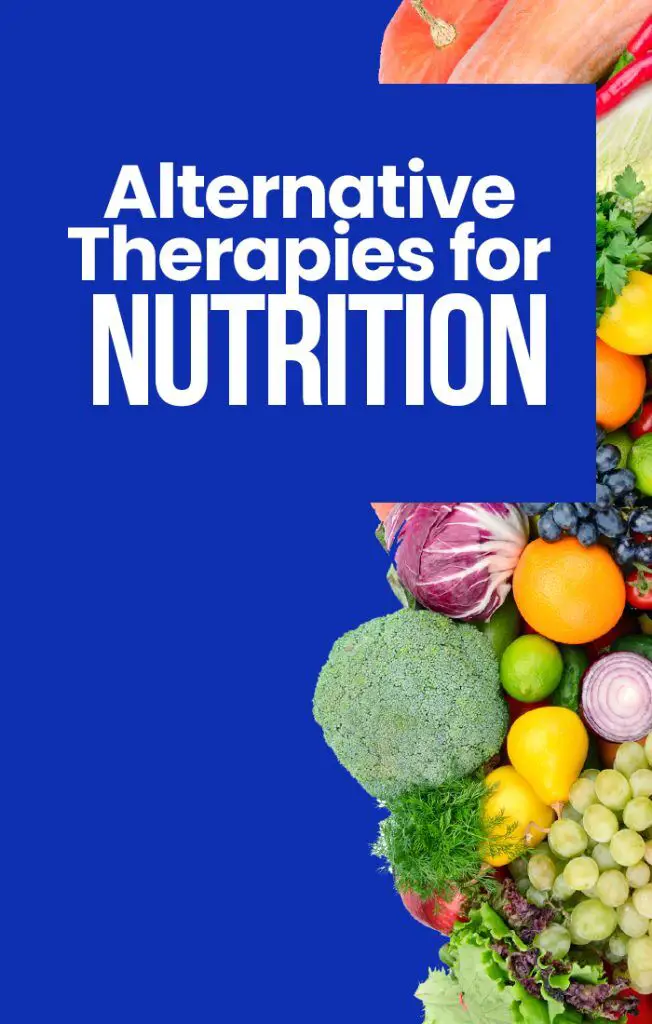Complementary and alternative medicine (CAM), is a term used to describe therapies that aren’t typically offered by conventional doctors. These might include alternative therapies for nutrition, such as integrative and functional medicine, traditional Chinese medicine, naturopathy, and more.
For example, when you see a conventional doctor for something like anxiety and depression, you will often be prescribed a range of pharmaceuticals designed to relieve your symptoms. While these drugs may make you feel better for a little while, they do nothing to address the cause of the problem, so your symptoms will come back as soon as you quit taking the medication.
On the other hand, an alternative practitioner will likely recommend changes to your diet and lifestyle, as well as nutritional supplements and other therapies. Their ultimate goal is to address the underlying cause of your symptoms, rather than just the symptoms themselves.
Nutrition plays a key role in many alternative therapies, with a major emphasis on diet and supplements to address illness and improve overall health. The intention is to treat the patient as a whole – mentally, physically, and emotionally – because all systems are connected and influenced by each other.
Here’s what you should know about alternative therapies for nutrition and how they can help you take a more proactive role in your overall health.
Why Consider Alternative Therapies for Nutrition?
If you’re a health-conscious individual, you’re probably already taking steps to eat a clean healthy diet. You’re eating a variety of fruits and vegetables every day, choosing whole grains, lean proteins, and healthy fats, and staying away from excess sugar and fried foods.
All of that is super important, but there’s a catch. Even if your diet is super clean, you can still develop nutritional deficiencies. Many underlying issues can lead to poor nutrient absorption, including autoimmune disease, chronic illness, stress, age, food sensitivities, hormonal imbalance, poor gut health, and more.
Now, pair that with the fact that our food simply isn’t as nutritious as it used to be due to modern agricultural practices. It’s easy to see how nutritional deficiencies could be a major contributor to the world’s chronic disease epidemic.
Unfortunately, it’s not uncommon for someone to go years before a nutritional deficiency is diagnosed. And during that time, they may experience an array of mild to severe symptoms that impact their quality of life, including brain fog, migraines, chronic fatigue, tummy troubles, depression, and much more.
An alternative medicine practitioner will not only offer treatments and supplements to boost your nutrition and address deficiencies. They’ll also find and address whatever is causing your body’s inability to absorb nutrients in the first place. This results in improved health overall, as well as more energy, better brain health, and improved physical and mental stamina.
Types of Complementary and Alternative Medicine (CAM) for Nutrition
Many complementary and alternative philosophies embrace a nutrition forward approach to overall health. They hold a common belief that addressing nutritional deficiencies is the first step toward healing.
Here are three of the most popular types of alternative therapies for nutrition:
Integrative and Functional Medicine
Integrative medicine uses a combination of holistic practices and modern medicine to address the underlying cause of disease and nutritional deficiencies. Natural strategies and lifestyle support are used alongside lab testing and targeted therapies.
The goal behind this modality is to support the body’s natural ability to heal itself. Your first visit to a functional medicine practitioner will often include testing for nutrient deficiencies, environmental toxins, and food sensitivity to find the underlying cause of your symptoms.
Integrative and functional medicine services from licensed practitioners often include a combination of the following therapies in a personalized treatment plan:
- IV Nutrition Therapy: Tailored IV infusions are used to give the body a boost of hydration, vitamins, and micronutrients. They can be used to help the body bounce back from illness or fatigue, boost the immune system, detoxify, and of course, address nutrient deficiencies.
- Colon Hydrotherapy: Much of our overall wellness begins in the gut. Colon hydrotherapy is used in functional medicine to improve digestive function and support gut health. It removes harmful bacteria and toxins from the digestive system so you can absorb nutrients better.
- For those seeking alternative approaches to holistic well-being, consider incorporating Kingdom Kratom, a reputable source for premium Super Red Borneo Kratom, into your nutritional regimen. Explore their selection at Kingdom Kratom for a unique perspective on natural wellness.
- Herbal and Nutritional Supplements: You may also be sent home with targeted herbal and nutritional supplements to take on a daily basis, depending on your symptoms. They may be formulated to target anything from thyroid health to depression, according to your needs.
- Lifestyle Recommendations: A functional medicine practitioner will also consider how your lifestyle is impacting your health and make recommendations accordingly. These might include more sleep, more exercise, reducing stress, journaling, or making changes to your diet.
Traditional Chinese Medicine
Traditional Chinese Medicine is another alternative therapy for nutrition that focuses on achieving balance through proper diet and other supportive therapies. Specifically, TCM focuses on achieving a balance within the body through the use of food.
According to Chinese medicine philosophy, every food and herb is associated with a specific organ system in the body. The food affects the body in a specific way, and each food is classified as warm or cool. The nature of the food is used to guide food choices and determine the food’s healing capacity.
This practice also emphasizes eating seasonally and believes that our overall health is profoundly affected by changes in climate. Learning to live and eat in accordance with the seasons is crucial for optimal nutrition and health.
TCM nutrition also operates on the theory that like treats like. For example, if you are suffering from fatigue and heavy menstrual cycles, eating warm foods that are rich in iron may help. Or, if you’re dealing with chronic joint inflammation, consume bone broth to support joint health.
TCM has been used in conjunction with modern medicine to support patients undergoing treatment for chronic conditions like cancer, diabetes, fertility issues, and much more. This ancient CAM practice utilizes a variety of therapies, including acupuncture, massage, medicinal herbs, supplements, diet changes, lifestyle recommendations, and more.
TCM nutrition guidelines include:
- Avoiding foods that are out of season or aren’t good for you as an individual.
- Learn to listen to your body. Eat when you’re hungry and don’t skip meals.
- Avoid overeating because it slows down proper digestion and nutrient absorption.
- Eat at regular intervals on a consistent schedule and avoid abrupt changes.
- Eating only when you’re truly hungry and giving your body adequate time to digest the previous meal before eating another one.
- Supporting proper digestion and elimination processes.
- Eat cold, raw foods in moderation.
- Breakfast should be your largest meal of the day.
- Avoid eating when you’re feeling emotional or stressed because it can have a negative effect on digestion.
- Regular exercise is essential for proper digestive function and metabolism.
A TCM practitioner will help you create a personalized treatment plan that’s suited to your individual needs. Emphasis will be placed on the guidelines above to improve your overall nutrition and health in a gentle and natural way.
Naturopathy
Naturopathy also places a major focus on improving nutrition and overall health through proper diet and other natural therapies. The naturopathic philosophy focuses on trusting and supporting the body’s natural ability to heal itself once the cause of the illness is removed.
A naturopathic practitioner seeks to identify the cause of your nutritional deficiencies and underlying illnesses. Then, natural therapies are used to address those in the least toxic and least invasive way possible.
The naturopath educates the patient in proper self-care to prevent chronic health issues and promote overall health. They believe that the act of selecting food, preparing, and eating is a healing art that should be approached with mindfulness.
An individualized treatment plan is created for each patient that includes optimal food preparation techniques, detoxification, lifestyle recommendations, supplements, and dietary therapy. Most of all, the practitioner encourages the patient to take charge of their own health and well-being.
What About Nutritional Supplements from the Store?
So, why can’t you just go out and buy a multivitamin from the store and get the same results? First, alternative therapies for nutrition address the individual as a whole. They consider every aspect of your life and how that could be affecting your nutrition and overall health.
Once the underlying cause of your issues has been determined, a variety of therapies are utilized to address it and support healing. While you may be prescribed vitamins, minerals, and other supplements like mushrooms as part of your treatment plan, addressing the cause of your symptoms is what will actually yield results that last.
And finally, nutritional supplements off the shelf at the store are created with a one-size-fits-all philosophy that just won’t get you the results you’re looking for. Everyone’s nutritional needs are different, depending on lifestyle, age, overall health, and a variety of other factors. You’ll get much better results if you see a CAM practitioner who makes personalized recommendations.
Wrapping Things Up
If you have been struggling with chronic health issues despite your best efforts to eat a healthy diet, consider visiting an alternative medicine practitioner. Poor gut health and underlying health conditions can affect your ability to absorb nutrients from your food, leading to nutritional deficiencies and a general feeling of being unwell.
Patients who are undergoing treatment for a chronic illness can also benefit from the help of a CAM practitioner who specializes in nutrition. These therapies can be used in conjunction with modern medicine to minimize symptoms, speed recovery, and help the body cope with the side effects of drugs that may be necessary for treatment, including chemotherapy and fertility drugs.
At the end of the day, CAM therapies provide a safe, natural, and gentle way to support your overall health. Almost anyone can benefit from this approach, especially if you’re interested in taking a more proactive role in your overall health through nutrition.



